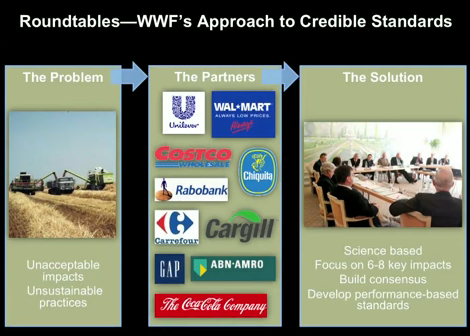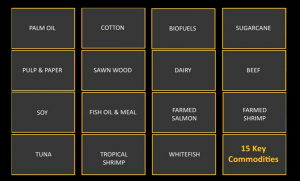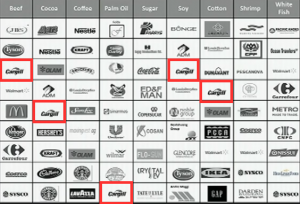Can Big Brands Protect Biodiversity and Influence Consumer Choices?
What if every product on the shelf at the supermarket was sustainable? Should consumers have the choice to buy a sustainable product versus one that isn’t? These are key questions that WWF’s Jason Clay addresses in his 2010 TED Talk “How big brands can help save biodiversity.” According to Clay, rapidly increasing consumption patterns, due to growing incomes, are largely to blame for negative environmental impacts and we must “use less to produce more.” But how can we expect 6.9 billion consumers to choose more sustainable products without access to all available data and high time constraints? The answer is simple: we can’t.
While watching this talk, I was surprised to learn that of the 15 key commodities that pose threats to biodiversity (Figure 1) in 35 sites worldwide, 100 companies control 25% of their trade (Figure 2). If these companies demand sustainable products from their producers, Clay argues that 40-50% of production will be pushed towards sustainable practices. This is a key example of the difference between push and pull strategies: The process of educating consumers on the importance of buying sustainable products in order to pull producers to cater to their needs is time consuming; producers are more likely to respond to companies pushing for sustainable products/processes as it directly influences their profits.
My main takeaway from this TED talk was the importance of making sustainability a pre-competitive issue. To achieve this, WWF actively creates roundtables to develop benchmarks and product/production standards. The entire value chain is included in the process from producers, traders, manufacturers, and retailers to NGOS and scientists. Although many big brands, such as Cargill, have voluntarily worked with WWF to improve their sustainability practices, roundtable commitments are voluntary and difficult to monitor. In March 2015, WWF’s Roundtable on Sustainable Palm Oil (RSPO) took action against many of its members who failed to submit reports on their sustainability commitments and found that “only 57 of the 119 registered growers [had] certified mills. I believe that more action must be taken by WWF to monitor sustainability commitments to ensure that changes are actually taking place within specific industries. With daily consumption continuing to increase, holding consumers responsible to make more sustainable choices simply is not feasible. It is essential for big brands to step up to the plate and honour their commitments if we hope to save biodiversity for future generations.



